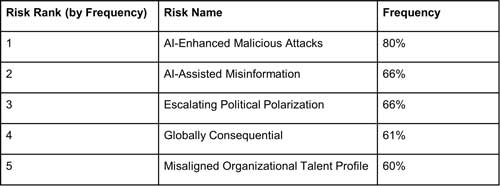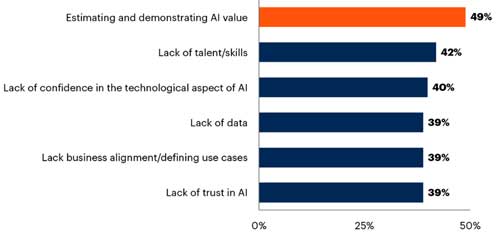News
Security and ROI Worries Blocking Orgs from Wider AI Adoption
- By Gladys Rama
- June 18, 2024
Two recent reports from research firm Gartner indicate that businesses are as wary of generative AI as they are keen to use it.
Security, of course, is perpetually at the top of the list of enterprise bugbears, and it's no different in the AI era. In a survey conducted by Gartner earlier this year of nearly 350 "senior enterprise risk executives," the vast majority cited AI-related security issues as their top concerns -- specifically, "AI-Enhanced Malicious Attacks" (cited by 80 percent) and "AI-Assisted Misinformation" (66 percent).
 Top Five Most Commonly Cited Emerging Risks in Q1 2024. (Source: Gartner)
Top Five Most Commonly Cited Emerging Risks in Q1 2024. (Source: Gartner)
"The prospect of malicious actions enabled by AI-assisted tools is concerning risk leaders worldwide," said Gartner's Gamika Takkar. "The relative ease of use and quality of AI-assisted tools, such as voice and image generation, increase the ability to carry out malicious attacks with wide-ranging consequences."
AI watchdogs were certainly put on high alert after OpenAI unveiled two new technologies this year -- one for generating hyper-believable videos using AI, and another that does the same for human voices. There have also been instances of cyberattack campaigns that use AI to spread malware.
Publicly, AI giants including OpenAI have professed their willingness to put more security guardrails around their technologies, even promising to discontinue those that pose too much risk. However, none of these commitments has risen above the level of sentiment yet.
Besides security, business leaders are also grappling with AI's actual ROI. In a separate Gartner survey of nearly 650 businesses, nearly half (49 percent) cited "Estimating and demonstrating AI value" as a top deterrent to more widespread adoption.
Other highly cited barriers included "Lack of talent/skills" (42 percent) and "Lack of confidence in the technological aspect of AI" (40 percent).
 Top Barriers to Implement AI Techniques. (Source: Gartner)
Top Barriers to Implement AI Techniques. (Source: Gartner)
Moreover, it's a long and uphill climb to carry an AI project from idea to reality. Gartner's survey determined that AI projects take an average of eight months to go from prototype to production, and less than half (48 percent) of them ever reach the finish line.
"Business value continues to be a challenge for organizations when it comes to AI," said Gartner Senior Director Analyst Leinar Ramos. "As organizations scale AI, they need to consider the total cost of ownership of their projects, as well as the wide spectrum of benefits beyond productivity improvement."
However, there's a small percentage of companies that have embraced AI to great effect. Gartner calls these companies "AI mature." Only about 9 percent of the survey's respondents fell in this category, though Gartner contends they have plenty to teach other organizations. Specifically, AI-mature companies have these four characteristics in common, according to Gartner:
- A scalable AI operating model, balancing centralized and distributed capabilities.
- A focus on AI engineering, designing a systematic way of building and deploying AI projects into production.
- An investment on upskilling and change management across the wider organization.
- A focus on trust, risk and security management (TRiSM) capabilities to mitigate the risks that come from AI implementations and drive better business outcomes.
Concluded Ramos, "AI-mature organizations invest in foundational capabilities that will remain relevant regardless of what happens tomorrow in the world of AI, and that allows them to scale their AI deployments efficiently and safely."